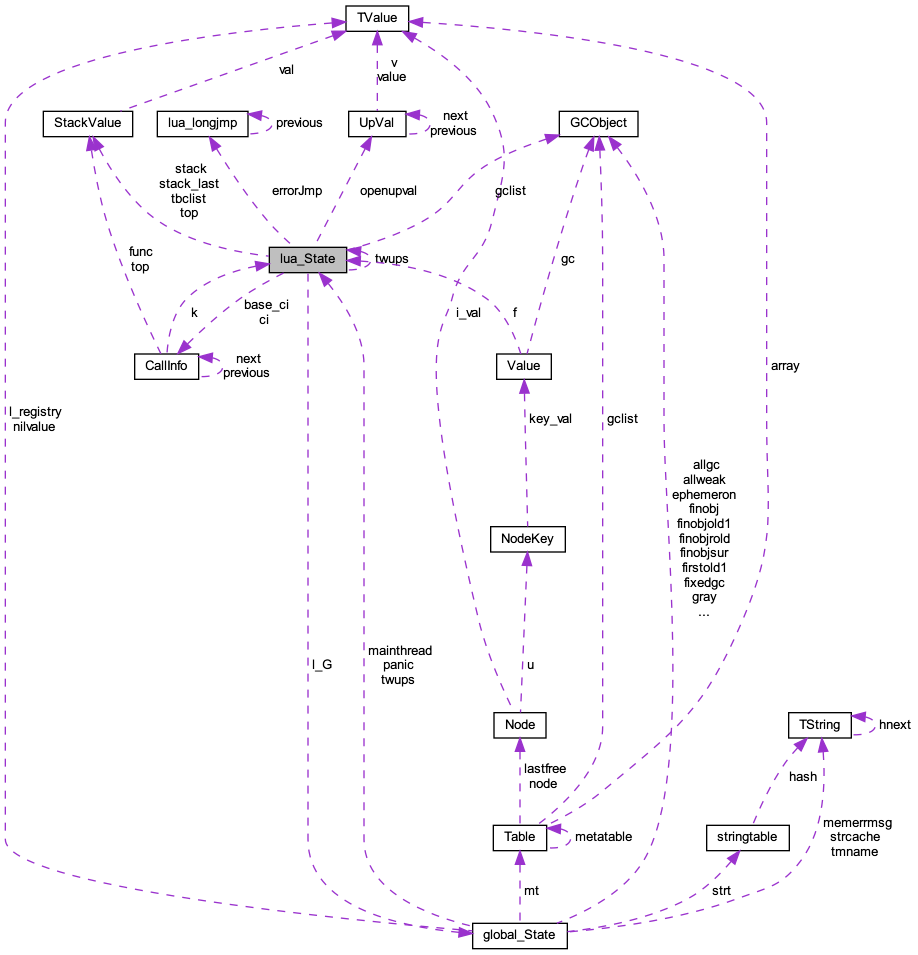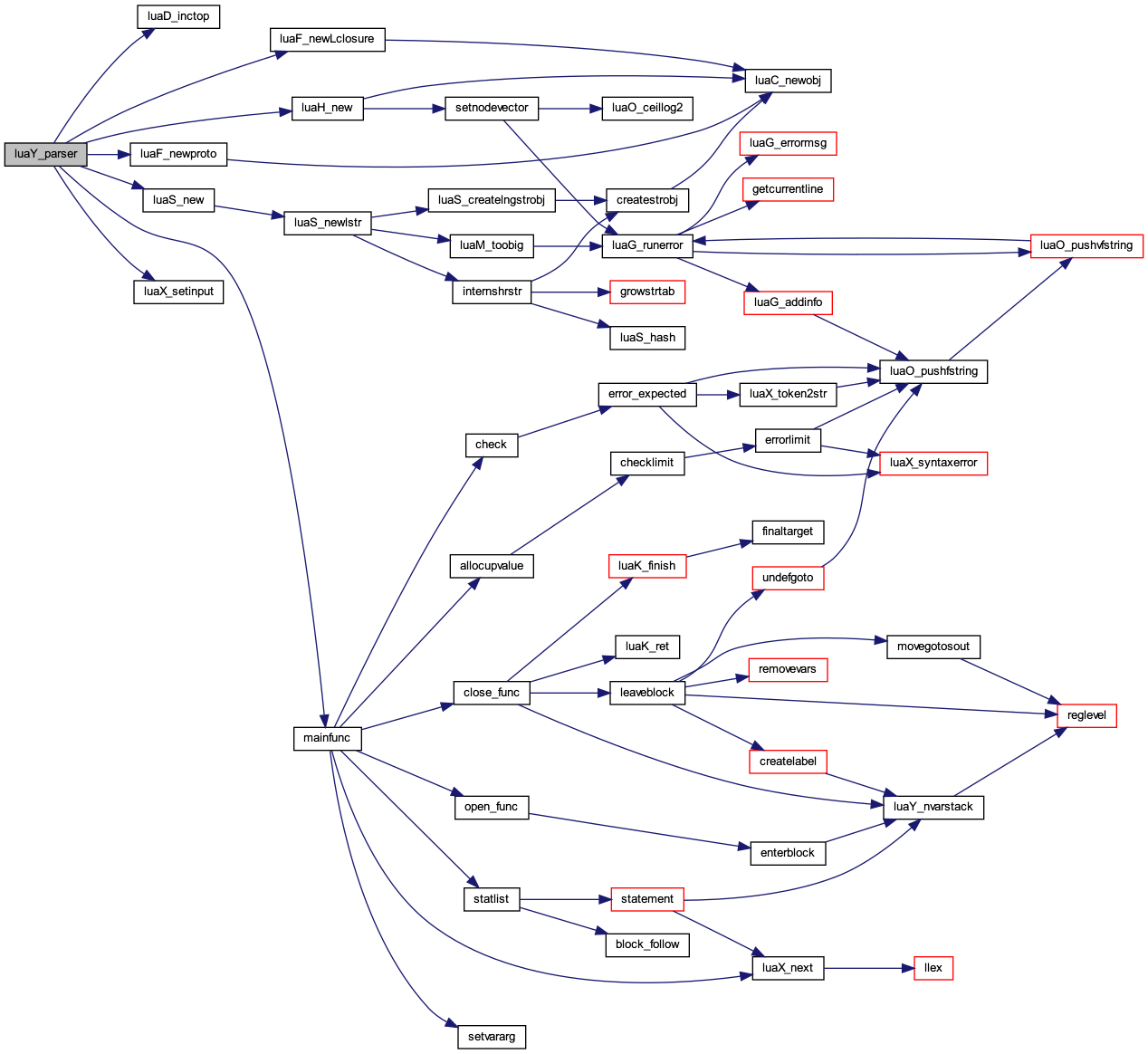Lua笔记
目录
Lua运行结构
graph LR 编译器==>PROTO==>虚拟机
1 相关数据结构
1.1 全局状态机
描述Lua运行状态,同时可以产生一种面向对象的模拟
struct lua_State {
CommonHeader;
lu_byte status;
lu_byte allowhook;
unsigned short nci; /* number of items in 'ci' list */
StkId top; /* first free slot in the stack */
global_State *l_G;
CallInfo *ci; /* call info for current function */
StkId stack_last; /* end of stack (last element + 1) */
StkId stack; /* stack base */
UpVal *openupval; /* list of open upvalues in this stack */
StkId tbclist; /* list of to-be-closed variables */
GCObject *gclist;
struct lua_State *twups; /* list of threads with open upvalues */
struct lua_longjmp *errorJmp; /* current error recover point */
CallInfo base_ci; /* CallInfo for first level (C calling Lua) */
volatile lua_Hook hook;
ptrdiff_t errfunc; /* current error handling function (stack index) */
l_uint32 nCcalls; /* number of nested (non-yieldable | C) calls */
int oldpc; /* last pc traced */
int basehookcount;
int hookcount;
volatile l_signalT hookmask;
};
2 Lua编译器
lua并没有直接运行源文件,而是将源文件编译成字节码,然后运行字节码 其中运行编译驱动文件名
luac.c
| 文件名 | 功能 | 入口函数 |
|---|---|---|
llex.c | 词法分析 | luaX_next |
lparser.c | 语法解析 | luaY_parser |
lcode.c | 代码生成 | luaK_finish |
ldump.c/lundump.c | 字节码 | luaU_dump/luaU_undump |
2.1 词法分析
2.1.1 外部接口
// 读取下一个单词
void luaX_next (LexState *ls);
// 预读下一个单词
int luaX_lookahead (LexState *ls);2.1.2 核心函数
// 词法分析状态机
typedef struct LexState {
int current; /* current character (charint) */
int linenumber; /* input line counter */
int lastline; /* line of last token 'consumed' */
Token t; /* current token */
Token lookahead; /* look ahead token */
struct FuncState *fs; /* current function (parser) */
struct lua_State *L;
ZIO *z; /* input stream */
Mbuffer *buff; /* buffer for tokens */
Table *h; /* to avoid collection/reuse strings */
struct Dyndata *dyd; /* dynamic structures used by the parser */
TString *source; /* current source name */
TString *envn; /* environment variable name */
} LexState;
// 语义信息
typedef union {
lua_Number r;
lua_Integer i;
TString *ts;
} SemInfo;
int llex (LexState *ls, SemInfo *seminfo);2.2 语法分析
typedef struct Proto {
CommonHeader;
lu_byte numparams; /* number of fixed (named) parameters */
lu_byte is_vararg;
lu_byte maxstacksize; /* number of registers needed by this function */
int sizeupvalues; /* size of 'upvalues' */
int sizek; /* size of 'k' */
int sizecode;
int sizelineinfo;
int sizep; /* size of 'p' */
int sizelocvars;
int sizeabslineinfo; /* size of 'abslineinfo' */
int linedefined; /* debug information */
int lastlinedefined; /* debug information */
TValue *k; /* constants used by the function */
Instruction *code; /* opcodes */
struct Proto **p; /* functions defined inside the function */
Upvaldesc *upvalues; /* upvalue information */
ls_byte *lineinfo; /* information about source lines (debug information) */
AbsLineInfo *abslineinfo; /* idem */
LocVar *locvars; /* information about local variables (debug information) */
TString *source; /* used for debug information */
GCObject *gclist;
} Proto;
typedef struct LClosure {
ClosureHeader;
struct Proto *p;
UpVal *upvals[1]; /* list of upvalues */
} LClosure;
LClosure *luaY_parser (
lua_State *L,
ZIO *z,
Mbuffer *buff,
Dyndata *dyd,
const char *name,
int firstchar);
2.3 代码生成
void luaK_finish (FuncState *fs) {
int i;
Proto *p = fs->f;
for (i = 0; i < fs->pc; i++) {
Instruction *pc = &p->code[i];
lua_assert(i == 0 || isOT(*(pc - 1)) == isIT(*pc));
switch (GET_OPCODE(*pc)) {
case OP_RETURN0: case OP_RETURN1: {
if (!(fs->needclose || p->is_vararg))
break; /* no extra work */
/* else use OP_RETURN to do the extra work */
SET_OPCODE(*pc, OP_RETURN);
} /* FALLTHROUGH */
case OP_RETURN: case OP_TAILCALL: {
if (fs->needclose)
SETARG_k(*pc, 1); /* signal that it needs to close */
if (p->is_vararg)
SETARG_C(*pc, p->numparams + 1); /* signal that it is vararg */
break;
}
case OP_JMP: {
int target = finaltarget(p->code, i);
fixjump(fs, i, target);
break;
}
default: break;
}
}
}2.4 字节码
int luaU_dump(lua_State *L, const Proto *f, lua_Writer w, void *data,
int strip) {
DumpState D;
D.L = L;
D.writer = w;
D.data = data;
D.strip = strip;
D.status = 0;
dumpHeader(&D);
dumpByte(&D, f->sizeupvalues);
dumpFunction(&D, f, NULL);
return D.status;
}
LClosure *luaU_undump(lua_State *L, ZIO *Z, const char *name) {
LoadState S;
LClosure *cl;
if (*name == '@' || *name == '=')
S.name = name + 1;
else if (*name == LUA_SIGNATURE[0])
S.name = "binary string";
else
S.name = name;
S.L = L;
S.Z = Z;
checkHeader(&S);
cl = luaF_newLclosure(L, loadByte(&S));
setclLvalue2s(L, L->top, cl);
luaD_inctop(L);
cl->p = luaF_newproto(L);
luaC_objbarrier(L, cl, cl->p);
loadFunction(&S, cl->p, NULL);
lua_assert(cl->nupvalues == cl->p->sizeupvalues);
luai_verifycode(L, cl->p);
return cl;
}3 Lua虚拟机
接受编译器产生的字节码并且运行,执行的入口函数是
luaV_execute
3.1 Lua指令分析
指令名 | 参数 | 描述 |
|---|---|---|
OP_MOVE | A B | R(A) := R(B) |
OP_LOADK | A Bx | R(A) := Kst(Bx) |
OP_LOADBOOL | A B C | R(A) := (Bool)B; if (C) pc++ |
OP_LOADNIL | A B | R(A) := ... := R(B) := nil |
OP_GETUPVAL | A B | R(A) := UpValue[B] |
OP_GETGLOBAL | A Bx | R(A) := Gbl[Kst(Bx)] |
OP_GETTABLE | A B C | R(A) := R(B)[RK(C)] |
OP_SETGLOBAL | A Bx | Gbl[Kst(Bx)] := R(A) |
OP_SETUPVAL | A B | UpValue[B] := R(A) |
OP_SETTABLE | A B C | `R(A)[RK(B)] := RK(C) |
OP_NEWTABLE | A B C | R(A) := {} (size = B,C) |
OP_SELF | A B C | R(A+1) := R(B); R(A) := R(B)[RK(C)] |
OP_ADD | A B C | R(A) := RK(B) + RK(C) |
OP_SUB | A B C | R(A) := RK(B) - RK(C) |
OP_MUL | A B C | R(A) := RK(B) * RK(C) |
OP_DIV | A B C | R(A) := RK(B) / RK(C) |
OP_MOD | A B C | R(A) := RK(B) % RK(C) |
OP_POW | A B C | R(A) := RK(B) ^ RK(C) |
OP_UNM | A B | R(A) := -R(B) |
OP_NOT | A B | R(A) := not R(B) |
OP_LEN | A B | R(A) := length of R(B) |
OP_CONCAT | A B C | R(A) := R(B).. ... ..R(C) |
OP_JMP | sBx | pc+=sBx |
OP_EQ | A B C | if ((RK(B) == RK(C)) ~= A) then pc++ |
OP_LT | A B C | if ((RK(B) < RK(C)) ~= A) then pc++ |
OP_LE | A B C | if ((RK(B) <= RK(C)) ~= A) then pc++ |
OP_TEST | A C | if not (R(A) <=> C) then pc++ |
OP_TESTSET | A B C | if (R(B) <=> C) then R(A) := R(B) else pc++ |
OP_CALL | A B C | R(A), ... ,R(A+C-2) := R(A)(R(A+1), ... ,R(A+B-1)) |
OP_TAILCALL | A B C | return R(A)(R(A+1), ... ,R(A+B-1)) |
OP_RETURN | A B | return R(A), ... ,R(A+B-2) (see note) |
OP_FORLOOP | A sBx | R(A)+=R(A+2); if R(A) <?= R(A+1) then { pc+=sBx; R(A+3)=R(A) } |
OP_FORPREP | A sBx | R(A)-=R(A+2); pc+=sBx |
OP_TFORLOOP | A C | R(A+3), ... ,R(A+2+C) := R(A)(R(A+1), R(A+2)); if R(A+3) ~= nil then R(A+2)=R(A+3) else pc++ |
OP_SETLIST | A B C | R(A)[(C-1)*FPF+i] := R(A+i), 1 <= i <= B |
OP_CLOSE | A | close all variables in the stack up to (>=) R(A) |
OP_CLOSURE | A Bx | R(A) := closure(KPROTO[Bx], R(A), ... ,R(A+n)) |
OP_VARARG | A B | R(A), R(A+1), ..., R(A+B-1) = vararg |
3.2 指令解析
lua_State *L; /* Lua状态机 */
LClosure *cl = &clvalue(L->ci->func)->l; /* 当前函数执行环境 */
TValue *k = cl->p->k; /* 函数环境常量数组 */
const Instruction *pc = L->savedpc; /* 当前函数指针 */
StkId base = L->base;; /* 函数环境栈基地址 */// R(A|B|C) 寄存器索引
#define RA(i) (base+GETARG_A(i))
#define RB(i) check_exp(getBMode(GET_OPCODE(i)) == OpArgR, base+GETARG_B(i))
#define RC(i) check_exp(getCMode(GET_OPCODE(i)) == OpArgR, base+GETARG_C(i))
// RKB() 寄存器索引或者常量索引
#define RKB(i) check_exp(getBMode(GET_OPCODE(i)) == OpArgK, \
ISK(GETARG_B(i)) ? k+INDEXK(GETARG_B(i)) : base+GETARG_B(i))
#define RKC(i) check_exp(getCMode(GET_OPCODE(i)) == OpArgK, \
ISK(GETARG_C(i)) ? k+INDEXK(GETARG_C(i)) : base+GETARG_C(i))
#define KBx(i) check_exp(getBMode(GET_OPCODE(i)) == OpArgK, k+GETARG_Bx(i))3.2.1 指令分发
const Instruction i = *pc++;
StkId ra = RA(i);3.2.2 钩子函数处理
// 不明白在处理什么
if ((L->hookmask & (LUA_MASKLINE | LUA_MASKCOUNT)) &&
(--L->hookcount == 0 || L->hookmask & LUA_MASKLINE)) {
traceexec(L, pc);
if (L->status == LUA_YIELD) { /* did hook yield? */
L->savedpc = pc - 1;
return;
}
base = L->base;
}3.2.3 OP_MOVE
#define setobjs2s setobj
case OP_MOVE: {
setobjs2s(L, ra, RB(i));
continue;
}3.2.4 OP_LOADK
#define setobj2s setobj
case OP_LOADK: {
setobj2s(L, ra, KBx(i));
continue;
}统一调用此函数
// 拷贝lua_TValue,也只有两个成员
void setobj(lua_State *L, const TValue *obj1, TValue *obj2)
{
const TValue *o2=(obj2);
TValue *o1=(obj1);
o1->value = o2->value;
o1->tt=o2->tt;
checkliveness(G(L),o1);
}3.2.5 OP_LOADBOOL
case OP_LOADBOOL: {
setbvalue(ra, GETARG_B(i));
if (GETARG_C(i))
pc++; /* skip next instruction (if C) */
continue;
}3.2.6 OP_LOADNIL
case OP_LOADNIL: {
TValue *rb = RB(i);
do {
setnilvalue(rb--);
} while (rb >= ra);
continue;
}3.2.7 OP_GETUPVAL
case OP_GETUPVAL: {
int b = GETARG_B(i);
setobj2s(L, ra, cl->upvals[b]->v);
continue;
}case OP_GETGLOBAL: {
TValue g;
TValue *rb = KBx(i);
sethvalue(L, &g, cl->env);
lua_assert(ttisstring(rb));
Protect(luaV_gettable(L, &g, rb, ra));
continue;
}case OP_GETTABLE: {
Protect(luaV_gettable(L, RB(i), RKC(i), ra));
continue;
}case OP_SETGLOBAL: {
TValue g;
sethvalue(L, &g, cl->env);
lua_assert(ttisstring(KBx(i)));
Protect(luaV_settable(L, &g, KBx(i), ra));
continue;
}case OP_SETUPVAL: {
UpVal *uv = cl->upvals[GETARG_B(i)];
setobj(L, uv->v, ra);
luaC_barrier(L, uv, ra);
continue;
}case OP_SETTABLE: {
Protect(luaV_settable(L, ra, RKB(i), RKC(i)));
continue;
}3.2.8 算术指令
case OP_ADD: {
arith_op(luai_numadd, TM_ADD);
continue;
}
case OP_SUB: {
arith_op(luai_numsub, TM_SUB);
continue;
}
case OP_MUL: {
arith_op(luai_nummul, TM_MUL);
continue;
}
case OP_DIV: {
arith_op(luai_numdiv, TM_DIV);
continue;
}
case OP_MOD: {
arith_op(luai_nummod, TM_MOD);
continue;
}
case OP_POW: {
arith_op(luai_numpow, TM_POW);
continue;
}统一调用arith_op,计算数据效果
| 功能 | 第一参数 | 第二参数 |
|---|---|---|
| 加 | #define luai_numadd(a,b) ((a)+(b)) | TM_ADD |
| 减 | #define luai_numsub(a,b) ((a)-(b)) | TM_SUB |
| 乘 | #define luai_nummul(a,b) ((a)*(b)) | TM_MUL |
| 除 | #define luai_numdiv(a,b) ((a)/(b)) | TM_DIV |
| 模 | #define luai_nummod(a,b) ((a) - floor((a)/(b))*(b)) | TM_MOD |
| 方 | #define luai_numpow(a,b) (pow(a,b)) | TM_POW |
void arith_op(op,tm)
{
TValue *rb = RKB(i); // 第二操作数
TValue *rc = RKC(i); // 第三操作数
if (ttisnumber(rb) && // 校验数据
ttisnumber(rc)) { // 校验数据
lua_Number nb = nvalue(rb); // 提取数据
lua_Number nc = nvalue(rc); // 提取数据
setnvalue(ra, op(nb, nc)); // 设置第一操作数
} else {
Protect(Arith(L, ra, rb, rc, tm)); // 如果操作数不是数据,那么强转
}
}
#define Protect(x) { L->savedpc = pc; {x;}; base = L->base; }
static void Arith (lua_State *L, StkId ra, const TValue *rb,
const TValue *rc, TMS op) {
TValue tempb, tempc;
const TValue *b, *c;
if ((b = luaV_tonumber(rb, &tempb)) != NULL &&
(c = luaV_tonumber(rc, &tempc)) != NULL) {
lua_Number nb = nvalue(b), nc = nvalue(c);
switch (op) {
case TM_ADD: setnvalue(ra, luai_numadd(nb, nc)); break;
case TM_SUB: setnvalue(ra, luai_numsub(nb, nc)); break;
case TM_MUL: setnvalue(ra, luai_nummul(nb, nc)); break;
case TM_DIV: setnvalue(ra, luai_numdiv(nb, nc)); break;
case TM_MOD: setnvalue(ra, luai_nummod(nb, nc)); break;
case TM_POW: setnvalue(ra, luai_numpow(nb, nc)); break;
case TM_UNM: setnvalue(ra, luai_numunm(nb)); break;
default: lua_assert(0); break;
}
}
else if (!call_binTM(L, rb, rc, ra, op))
luaG_aritherror(L, rb, rc);
}